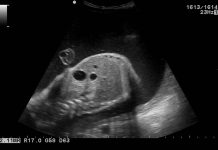All the mommies out there, we are officially parents when we have smelled our little one’s bottom to make sure they have pooped or not. Lately we mommies talk a lot about our little one’s poop and as a matter of fact we never find it gross.
Decoding the diaper is sometimes the most confusing task for the new parents. We might be asking ourselves a lot of questions regarding the color, consistency, frequency etc of the stool to make sure if our infant is having a healthy bowel movement.
Let us take a closer look and explore into a whole new world, which we would have probably never done, if it was not for our little bundle of joy.
Read More: Why Is My Baby’s Poop Green?
11 Ways to Decode a Baby’s Poop
1) Black coloured stool
During the first few days of life, the baby’s poop appears black, sticky and tar-like. This is absolutely normal and nothing to worry about. This black stool is called meconium and it mostly consists of amniotic fluid, skin cell and other little contents which the baby must have ingested in the uterus. This black coloured stool might last from 24 to 72 hours. It might take even longer if the baby is bottle fed and until all the meconium is out of its system. Colostrum acts as a natural laxative, so breast fed babies pass meconium at a faster rate. If your baby does not clear his or her bowel within first few days, be sure to approach a doctor.
2) Green and less sticky stool
After meconium is completely cleared out, the baby’s poop transforms from black to army green. This is the transitional stool and is a good indication that your baby’s excretory organs are beginning to work well. The baby’s body is adapting to the new surroundings and working accordingly.
3) Yellow-green colored and mushy stool
As the days pass by and the baby is getting used to breast milk or formula milk his or her stool changes to yellow colour and mostly looks like mushy cottage cheese. The stools have a seedy hue and the baby poops quite frequently at this stage, but this is nothing to worry about.
4) Tan colored and thick stool
Babies that are given formula milk often pass tan coloured and paste like poop. This is a little smellier than the poop of babies that are exclusively breast fed. This is actually normal. There is nothing to worry unless the poop is super watery which may indicate diarrhoea.
5) Bright green frothy stool
The exclusively breast fed babies sometimes pass bright green, frothy, algae like poop. This indicates that the baby is getting more of fore milk which is sweet and watery and less of hind milk which is thick and has more fat. If this happens try to nurse the baby longer. There is nothing to worry about as long as the baby is active and does not show any discomfort.
6) Dark green or black poop
Sometimes doctors prescribe iron supplements to be given to the baby. In such cases the poop may turn black. Though this shouldn’t be happening often, it is absolutely normal and not a cause of concern. But in case, you do not give any iron supplement and your baby’s stool is black in colour, you should reach the doctor at the earliest.
7) Brown, smelly stool
Once the baby is 6 months old, we introduce solid food. Now the poop completely depends on what the baby eats. For example fruits, vegetables etc results in looser stools and meat, eggs, dairy products cause firm and very smelly poops.
8) Baby poop with undigested bits of food
Sometimes you may find little chunks of food in your baby’s poop. It so happens sometimes that the food directly passes out of the intestine without getting digested. It is not of great concern unless it happens every other day.
9) If the stool is too watery it may be due to diarrhea and if it is too firm like pebbles it may be due to constipation and this definitely needs your doctor’s attention.
10) White colored stool
This is really a cause for great concern as white coloured stools indicate some serious health condition related to gall bladder of the baby and needs immediate attention.
11) Red colored or black colored stool
This is not also not normal, as this points to blood in the stool which may be due to some problems in the intestine and should never be overlooked. Call your doctor right away and get it diagnosed.
Sometimes the baby doesn’t pass stool for 2 to 3 days in a row. It is not really a cause of much worry, as breast milk is mostly water and has very little or no residue, so it may take 2 to 3 days for the waste to accumulate.
Poop is one of the main indicators of a baby’s health and well-being. So dear parents keep checking your baby’s poop on a daily basis and keep a tab on his or health.













